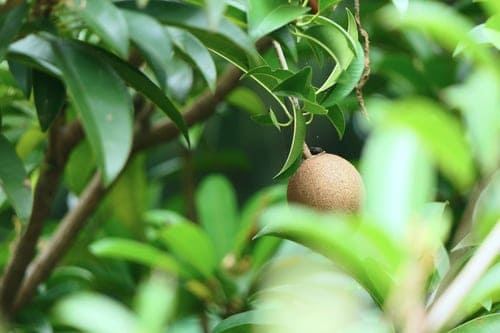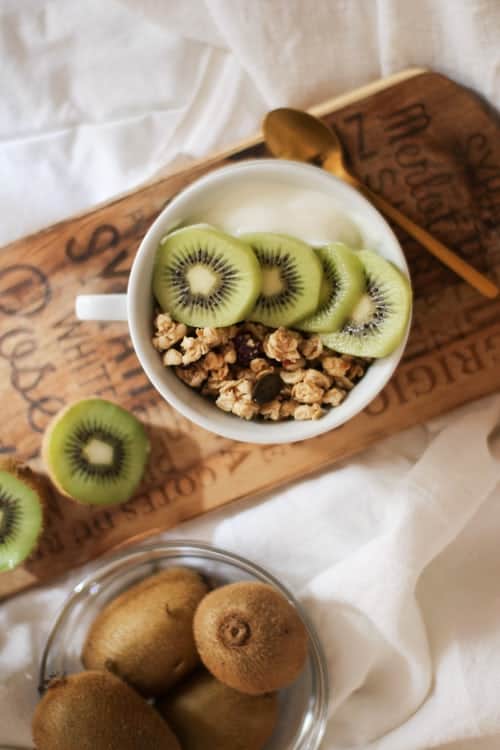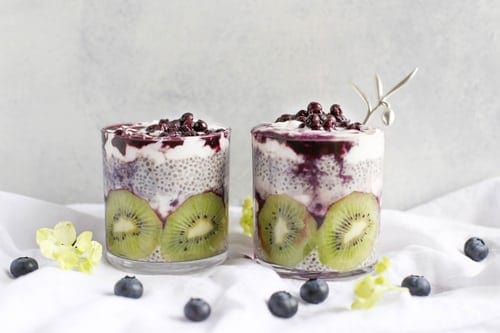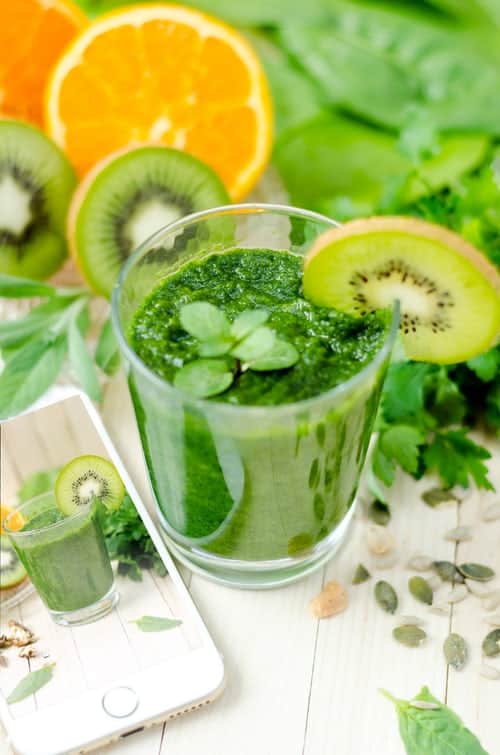
It's amazing what one small furry fruit can do. Over the last decade, you would have heard the term 'superfood' thrown around a lot. Superfoods are much like a fashion trend, they're talked about for a few months and then once everyone has tried it, it somehow seems to just slowly dissipate.
Remember when Kale became a crazed superfood trend? Suddenly every cafe and restaurant was offering juiced Kale, boiled Kale, and Kale chips, you name it! After a while, research came out that Spinach had very similar nutrients to Kale, plus some added Vitamins that are not found in Kale.
The Kale craze had officially ended. I mean who actually enjoyed eating Kale anyway?
But what if I told you that one such 'superfood' has never lost its superpowers?
Meet the humble Kiwifruit. A crazy fact that isn't well known is that kiwifruit, or Chinese gooseberry, originally grew wild in China. Kiwifruits are a known 'Medicinal' plant in the country and with good reason.

Kiwis are small fruits with big benefits.
Their green flesh is sweet and tangy. Their small black seeds are edible, as is the fuzzy brown peel, though many prefer to peel the kiwi before eating it. You can also buy 'Golden Kiwis' which have a smooth peel.
The story goes that a schoolteacher introduced the fruit to New Zealand in 1904, upon returning from China with the seeds sewn into his pockets. The New Zealanders then named it “kiwi” after their national bird, the Kiwi.
Kiwis are nutrient-dense food. They are rich in nutrients and low in calories. Each kiwi has about 60-70 calories, making them a perfect snack for anyone trying to lose weight.
You can combine 2 kiwis with some Greek Yoghurt and boom! There’s your superfood snack. So easy.

Kiwifruit has since gained a reputation as a 'super food' or 'health food' because of its high vitamin C content, but the fruit is also abundant in many other nutrients like vitamin K, vitamin E, folate, and potassium. They also have a lot of antioxidants and are a good source of fibre.
Antioxidants like choline, lutein, and zeaxanthin are very helpful in removing free radicals from the body. Free radicals are typically known as unstable atoms that the body produces during metabolism, immune system responses and ageing.
When too many free radicals build up, they cause oxidative stress, which may result in cell damage inside the body. This impairment of the cells can lead to many health problems such as cancer and heart disease.
Antioxidants help fight free radicals, by protecting your cells.
There are so many benefits of kiwifruit, but here are the main (and most useful) ones:
- Constipation prevention and regular bowel movements (A kiwi a day keeps the gastroenterologist away)
Kiwifruit has been shown to ease constipation and improve bowel movement frequency in several clinical studies. This is because they contain lots of fibre and contain unique proprieties due to Kiwi's interesting composition of insoluble and soluble fibres, which work together concurrently to battle constipation.
One kiwi provides around 2g of fibre or 6–9% of an adult’s daily fibre requirement.
A 2019 study concluded that when healthy people eat kiwis, their small intestines are better able to retain water, leading to greater stool frequency and softer stool consistency.
The authors of the study recommended that kiwifruit could be a natural alternative to medical laxatives for people with mild constipation.
- Aids digestion (Especially in high fat/protein diets like KETO)
Kiwifruit contains lots of digestive aids. According to Zespri, Actinidin is one such aid. Actinidin is a unique protease found in kiwifruit, which breaks down proteins and expedites gastric digestion. This natural enzyme can break down a wide range of food proteins more completely and faster than our natural digestive enzymes can do on their own, hence they are a great alternative to store-bought digestive aids.
- Healthy and youthful skin
Healthy skin requires constant collagen production to function properly.
Vitamin C contributes to the creation of collagen in a major way. Collagen is a key component in cells and organs throughout the body, including the skin. Vitamin C also boosts the body’s ability to repair injuries and wounds.
A kiwi weighing 69 grams provides 64 milligrams (mg) of vitamin C. This represents 71–85% of an adult’s daily vitamin C requirement. Incredible!
Kiwifruit also provides vitamin E or tocopherol. The unique antioxidant characteristics of vitamin E and its ability to help protect the skin from sun damage, and wrinkle formation (glycation) may help prevent skin disorders such as eczema and acne.

- Anti-inflammatory reaction
Kiwis have unique anti-inflammatory proteins. Kiwellin and Kissper are two such proteins in kiwifruit that contain anti-inflammatory properties. Several laboratory conclusions have indicated that Kissper may assist manage inflammation in the human intestines (both small and large), thereby possibly benefiting people who suffer from IBS, IBD, CD and UC by efficiently neutralising the oxidative stress and inflammatory response invaluable model systems consisting of intestinal cells and CD colonic mucosa. (Read more here)
- Improved sleep (this is an interesting one)
In 2011, a study examined the effects of kiwifruit on sleep quality in adults with sleep problems. The researchers found that eating kiwis enhanced sleep and the ability to fall asleep, according to self-reported measures.
Eating 1–2 medium kiwis before bed may help you fall asleep faster and stay asleep longer.
The scientists proposed that this benefit may derive from the antioxidant and serotonin contents of kiwis.
- Improved blood pressure and heart health
Due to Kiwi's high fibre content, as well as loads of potassium and antioxidants, a person's heart health can be greatly supported by eating the fruit.
Potassium promotes relaxation of the blood vessels, which assists manage blood pressure, and people with low blood pressure tend to be less likely to develop cardiovascular disease.
One kiwi contains about 215 mg of potassium, which is approximately 5% of an adult’s daily requirement.
The high fibre content of Kiwis can also benefit cardiovascular health. A medical review published in 2017 found that somebody who consumes high amounts of fibre has a lower risk of developing cardiovascular disease. These people also have less “bad cholesterol", or low-density lipoprotein.
- Pregnancy support
Folate is a well-known nutrient required by a pregnant woman to maintain the growing foetus’s health. Folate is crucial during early pregnancy to reduce the risk of birth defects in the brain and spine.
As mentioned above, Kiwis contain folate, which is essential for cell division. One kiwi provides around 17.2 micrograms (mcg) of folate.
According to The American College of Obstetricians and Gynaecologists, every pregnant woman should consume at least 600 micrograms (mcg) of folic acid daily. It may be a good idea to combine a few kiwifruits a day with your Prenatal vitamins for optimal intake of Folate.

Now that we've learnt about some of the amazing benefits of Kiwifruit, how should we incorporate them into our diet?
- Eating kiwis raw- Cut a ripe kiwi in half, leaving the skin on, and eating each half with a spoon. If you prefer, cut the skin off or buy Golden Kiwis.
- Smoothies - Create a fruit smoothie with kiwi, pineapple, coconut milk, frozen mango and strawberry chunks.
- Add diced kiwi to a colourful salad of spinach, kale, walnuts, dried cranberries, diced apple, feta cheese, dressed in lemon, olive oil and salt.
- Freeze slices of kiwi and eat them as a snack or dessert on a hot day.
To read more about the amazing benefits of Kiwi fruit, click here.
Happy Kiwi eating!
Note: I am not a dietician or qualified nutritionist, the exerts and information in this article were compounded from research performed by medical professionals and scientists.
This article is not intended to provide specialty medical advice, and the points in this article may not apply to everyone.
Always seek professional medical advice when in doubt.
*More on GCT: Will Greek yoghurt be the next great ‘Superfood’?

